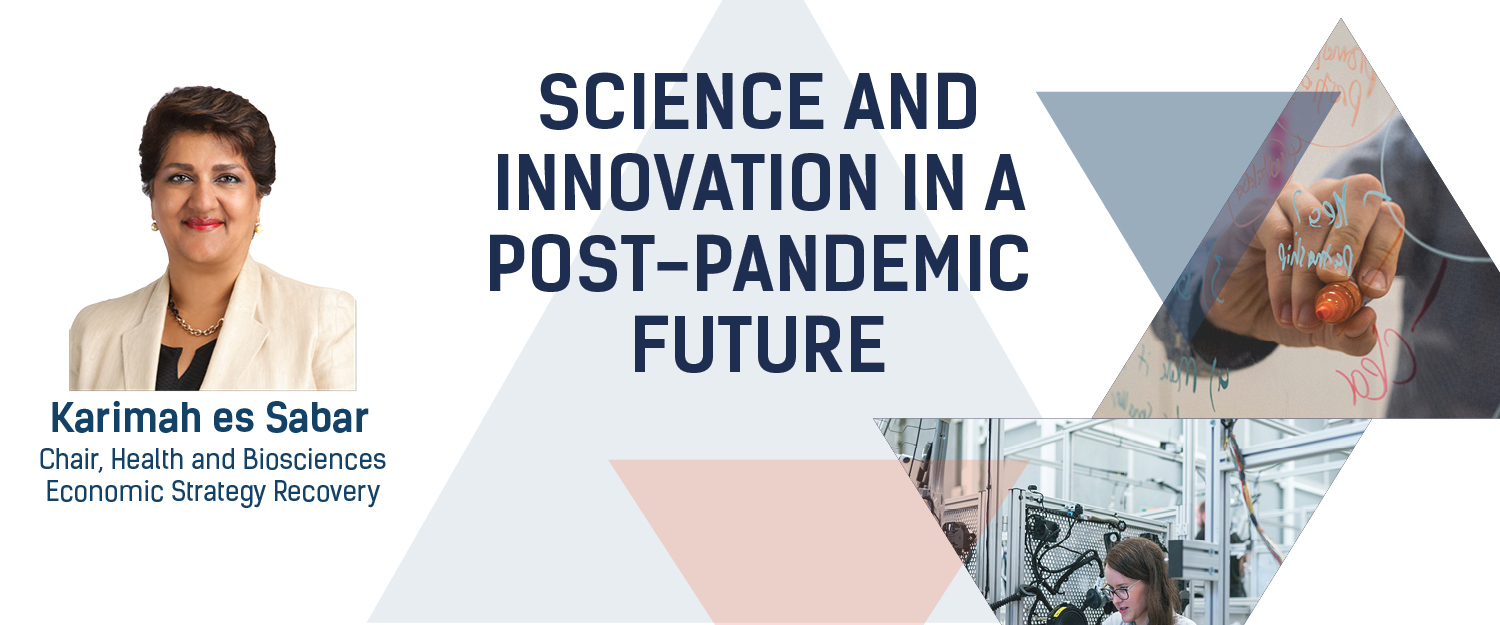Science and Innovation in a Post-Pandemic Future

Author(s):
Karimah es Sabar
Health and Biosciences Economic Strategy Recovery
Chair
The COVID 19 pandemic has negatively impacted most industry sectors in Canada; and the effects of the last 18 months will have knock-on impacts for decades. Yet, one sector has continued to excel through the challenges – biosciences. Just as power-driven machines defined the Industrial Revolution, biosciences will frame the 21st century, a world that will be shaped in part by our ability to respond quickly and nimbly to future global crises.
Encompassing everything from medical device manufacturing to biopharmaceutical development and the latest diagnostic tools, the biosciences industry is the engine that will propel successful nations forward. Canada can, and must, be one of those nations. While the pandemic showcased Canada’s biosciences talent and boosted the growth of several high-quality companies, we need to do more in order to thrive post-pandemic, and we need to do it now. At the outset, governments at all levels must foster ingenuity and embrace innovative policy decisions to nurture and grow a robust, sustainable biotechnology ecosystem in Canada. We need to cut red tape, power through the noise, and get serious about maximizing, nurturing and retaining our talent, resources and companies.
Vaccine equity: no one is safe until we all are
There is a reason Canadian backpackers stick maple leaves onto their bags—we are a nation that people are proud to belong to. We have a global reputation as peacekeepers and humanitarians. Lately we have slacked off, it is time to re-earn that reputation: we cannot rest on our successes while most of the world remains vulnerable and unvaccinated. Most African nations currently have less than a 20% immunization rate. [1] The time for hoarding vaccines and ensuring only our own supply is over—viruses have no respect for borders, and only when everyone in the world is vaccinated will this pandemic be truly contained.
Investing in global health just makes good sense when we build and share our technology, we make a better world for everyone. However, we can only do good for others when our own house is in order: science and innovation must be made the cornerstone of our economic and societal recovery. To be ready for the next time we are hit by a (health) crisis, to mitigate it and respond quickly and nimbly, we will need to be prepared. Early action is needed to invest in Canadian-based vaccine manufacturing: no longer should we depend on others. Only once we are self-sufficient can we truly support others globally and fulfill Canada’s humanitarian promise to the world.
Prevention, primary intervention and early response is a much sounder medical and financial approach than having to deal with the sequalae of the problems. Preparation is a cost-effective strategy that ensures quality of life and healthy societies. As a nation, we rank fourth globally for scientific publications [2] and our academic system is enviable. But it’s not enough. We must build on Canadian science and innovation in all stages of the research and development continuum by maintaining momentum, retaining talent and creating anchor companies. We must think scope and scale—yes, we’re a small nation, but we have the potential to build and anchor world leading companies. All our players—academia, research, philanthropic organizations, industry, government— need to be rowing together.
International leadership
In a global context, Canada has the opportunity to take leadership. With 4.8 million Canadians having tertiary education in STEM [2] biosciences and cleantech are areas where Canada’s companies can produce for the world building on our existing strengths. Our investment in industry must be taken to a new level by re-examining our life sciences and biomanufacturing sectors and building them up to a higher capacity. The Canadian Biomanufacturing and Life Sciences Strategy [3], announced in July of 2021, outlines how we become a self-sufficient nation, while orchestrating international cooperation in health crises.
Health and biosciences, in addition to clean tech and digitization are the three-legged stool of an innovation-driven economy. For Canada to maintain its quality-of-life standards and leadership position in the global scientific arena, we must foster and nurture a robust innovation-driven economy. Emerging markets are proving to be aggressive competitors in these areas. Vietnam, for instance, has gradually been increasing public health expenditure at an average of 9% since 2003 when the SARS pandemic struck. A relatively small Asian nation of 95 million people, Vietnam, quickly mobilized digital technology with the Ministry of Public Health relying on transparency and communicating with third-party agencies as it tracked, traced and published all confirmed cases on a publicly accessible online tracker. These strategies clearly paid off: today, Vietnam has had one of the lowest death tolls from COVID-19. [4]
The Future: Science & Innovation as Diplomacy
The pandemic has clearly shown us how intertwined and interdependent our small world really is, despite geographic boundaries. It has also thrust to the forefront the opportunities presented to Canada’s scientific capacity on a global scale. Our success as a nation allows us to deploy science and innovation diplomacy to benefit all of humanity. It may be a bold goal, but it is one worth aspiring to.
There are many areas of science where we can collaborate globally even with the most challenging of countries: the language of science is international. Through collaboration, there is a human connection and the ability to enable a betterment in quality of life amongst countries that need it the most. “Scientific diplomacy” also provides us an opportunity to exercise soft power and influence human rights and other social and environmental standards which Canada holds dear.
There are many reasons for prioritizing and powering Canadian biosciences and cleantech ecosystems as a cornerstone to building a healthy and sustainable economy, not the least being to improve the lives of all Canadians as well as of other fellow human beings who need our help, and with whom we share this planet.
1- https://www.afro.who.int/news/africa-faces-470-million-covid-19-vaccine-shortfall-2021

